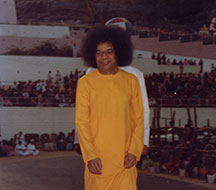
Why Do We Chant Shanthi Mantram Thrice
Puttaparthi, Sai Kulwanth Hall (Sankranthi )
Description
People say “Shanthi, Shanthi, Shanthi”, peace, peace, peace. Why should one chant it thrice? Is it not enough if one says it only once? Or twice? Or say it four times? Why is it said only three times? “Aadi bhautikam, adi daivikam, adhyatmikam” peace is needed at the three levels namely on the body, mind and spiritual levels because man is not one person but three. “The one, you think you are” is the body. “The one, others think you are” is the mind. “The one you really are” is the atma or self. Peace on these three levels is needed. That is the reason why the “Shanthi” is recited thrice. People have been reciting “Shanthi” for the past thirty years but they are yet to find peace. People only repeat it like the gramophone record or the tape recorder. When one recites ‘Shanthi’ does one really experience peace within? People fight with others and carry home the anger. The worship and bhajans are all done with an agitated mind. The recitation of the Shanthi mantra at the end, too, is said with bitterness. The utterance of ‘Shanthi’ itself is without peacem then how can one aspire to attain peace? Hence at all times and under any circumstances soft words must be spoken. Soft and sweet words calm the mind and soothe the heart. So man must not give scope for agitation or worry.
Topics
-Shanthi
-
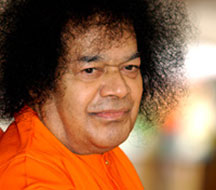
Learnt to find peace from pieces
00:00:34Every object in this world causes fear; is ever changing, is fleeting and temporary. Man must attain the permanent within this fleeting world; attain selflessness in selfishness; strive to get pleasure out of the troubles.
-
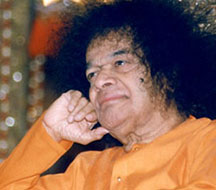
Without patience, peace is not conferred
00:01:00Never spread individual dissatisfaction to others. You must not subject others to your dissatisfaction or agitation. If there is any restlessness in you, contain it within yourself. Never try to trouble others with it. You might get angered by people at home. But you must contain it. You must develop such patience. That is necessary. In this context Thyagaraja sang: “Shantamu leka saukhyamu ledu Sarasadala nayana! Without peace there is no prosperity O lotus eyed one!!” Without peace there can no happiness. Who needs peace? Be it one who has mastered the senses or a philosopher, be it a slave of senses or master of senses- they must have peace. Vedas taught such peace. Vedas propagate unity.
-
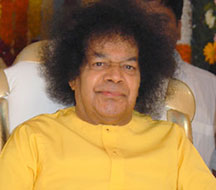
Peace is very essential for everyone
00:00:58There is no happiness greater than peace. “Shanthamu leka saukhyamu ledu, saarasadala nayana! Daanthunikaina vedanthunikaina” Without tranquillity there is no pleasure, O lotus eyed one!! Be it an ascetic or a scholar, Without tranquillity there is no pleasure! Thus sang Tyagaraja. Peace is very essential. Peace must be at physical and mental level too. It is not sufficient if the peace is at body level. All that is outside is the reflection of the inner being. They are the reflections of the inner being. Hence one must first and foremost check all that which comes from within. This is called as “indriya nigraha”, control of senses.
-
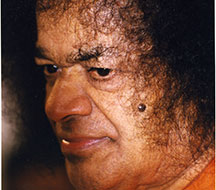
Peace is within you; Analogy of a rich man
00:03:55A rich man decided to go on a pilgrimage. He thought that carrying too much luggage would create discomfort during the travel so he packed all the essential things into single bedding. One can notice the slogan “less luggage more comfort, makes travel a pleasure!” in many railway stations. Though rich, he packed all his daily essentials in only one bedding. He visited pilgrim centres like Kashi, Mathura and Brindavan. During the day he used to visit the temples and participate in good activities. But he could not sleep at night though he wanted to rest and sleep. He was getting tired. It is possible to live without food but to live without sleep is very difficult. He visited the temples and did good deeds during the day but was devoid of sleep at night. What is the reason behind it? Bodily he was visiting beautiful divine idols in temples; bathing in sacred rivers. “Darshanam papanaasanam, sambhashanam sankata naasanam,sparsanam karma vimochanam” mere darshan of divine removes the sins, talking to them annihilates calamities, and touching them absolves one of the accumulated sins. This rich man was successful at achieving the above three aspects of pilgrimage. Yet he did not find peace. There were many bed bugs in his bedding and those were the reason for the rich man’s sleepless nights. Man’s plight today is similar. Bodily man seems to be enjoying all physical comforts and pleasures but internally he is pestered with ‘bed bugs’ of bad qualities and bad thoughts. Man does not get peace as long as those ‘bed bugs’ are inside. Peace is not available outside. It is only pieces outside. ‘Atma shanti’, peace within is the true peace. Hence peace is not one that can neither be earned nor is it available by studies nor can it be received from somebody. Man is himself the embodiment of love. Man is truly the embodiment of peace, truth, and God. Man must make efforts to realise such eternal truth.
-
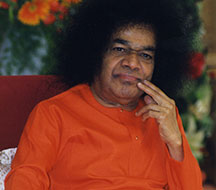
Peace rests within you
00:03:38Everyone aspires for peace but peace does not exist somewhere distant from one. To search for peace in religion is a waste of time. A true seeker of peace must search within him and not in religion. Peace is within and not in religion. One faces agitation and chaos when one tries to find peace elsewhere. First and foremost one must strive to develop peace within oneself. Then one must try to develop peace in the family. One must spread it from the family to the village and then extend it to the state and then spread it across nation. Therefore, for peace in nation, there must be peace in the individual. Unfortunately, instead of spreading peace worldwide, man today spreads chaos and strife from individual to family, from family to village, village to state and from state to the whole nation. One must try to be only angels of peace but not the carriers of chaos and strife. Hence, in order to spread peace around one must take steps to develop peace within oneself. Where can one find peace? Peace is found only in service. The mind, of a man bereft of service, is devil’s workshop. An idle man sits around inert, like a piece of log, and cannot even sleep. The mind of such a man is a fertile ground for unwanted thoughts, which in the end leads to mental illness. On the other hand, the mind of a working and active person is free from unnecessary thoughts. The state of mind devoid of thoughts is peace!
-
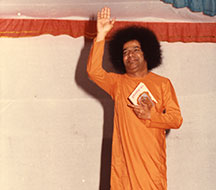
Without peace, one cannot be happy; Analogies of Churchill and Prahlada
00:02:00We find the science more and more increasing. It gives you lot of comfort. What is the use of all this comforts , no peace anywhere. When there is no peace do you consider that you are happy? Man needs peace. Man has progressed in every way. Churchill said the same thing at one time. Man achieved everything, he experienced everything. But he could not know himself and conquer himself. Man has conquered all, but he has not conquered himself that is what he said. If he cannot conquer himself, what is the fun of conquering all. The same thing was stated by the boy Prahaladha then. He started teaching lesson to his father. Father, you could have captured all five elements and play with them, but you could not conquer yourself. In fact you have conquered the whole world and five elements, but what is the use, when you have not conquered yourself. In a moment of time you conquered the world. Father, you could not win over the senses. You achieved everything, but you could not have control over your senses. You have no control on your mind. Without these what is the fun of achievement. First control your mind. You can control the mind in spiritual path only.
-
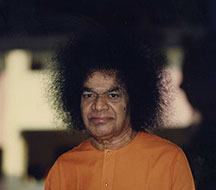
Secular knowledge cannot give you eternal peace
00:01:17The sage Narada, who was proficient in 64 branches of knowledge, suffered from lack of peace, so he went to Sanat Kumara. He appealed to him, “Swami! Dispel my ignorance and teach me the way to attain peace.” Sanat Kumara said, “Narada! There is no field of knowledge in which you are not proficient. You know all the methods prescribed by the Vedas, the Upanishads, and other Sastras (spiritual texts). But all this knowledge has not conferred any happiness on you. All this knowledge is concerned with the phenomenal world, which is transient in its character. You cannot secure peace till you gain knowledge of the Eternal.”
-
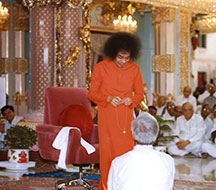
How to attain peace and happiness
00:02:32What is this peace? We repeat this word "Shanthi", Peace, thrice. (This stands for) Peace at the physical level, at the level of the mind and at the level of the spirit. Peace at these three levels, physical, psychological and of the spirit are necessary. We let in peace at all these three levels by praying to God. The one who doesn't love God can never be happy in life. We want to be happy in every way. The worldly happiness is only temporary. The same is stated by Shankaracharya, that this is not true happiness. "Oh man! Why do you pride yourself because of your money, your authority and youth, that will all vanish in a moment?" Will it give us happiness if we sit in an air-conditioned room? If you partake delicious items will you be happy? No. They only give you happiness at the physical and mental level, not at the level of the spirit. The true happiness is the bliss of the spirit. We should not be afraid of worldly difficulties. They are quite natural - like passing clouds. Why should you waver watching the passing clouds, the problems? You should go by your heart, which is steady, which is unwavering, which is eternal, immortal. We have to understand the unity of these three.
-
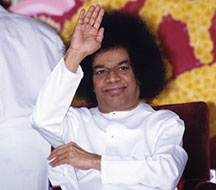
How to find peace and where is it
00:01:00Where is peace? Physically, one is at peace in deep sleep. When the thought process is withdrawn, one is peaceful. It is not an easy task to control one’s thoughts. Therefore, to the extent possible, one needs to observe silence atleast for an hour in a day. Incessant talk makes the nerves in the brain weak. On the other hand, if one indulges in sanctifying and sacred talk, it recharges the mind and body. Indulging in scandals, criticisms and vain talks diminishes the quality of life.
Topics
- Analogies
- Atma
- Attachment
- Balvikas
- Bhaja Govindam
- Bhajans
- Body
- Character
- Company
- Compassion
- Culture
- Day to day
- Desire
- Devotees
- Devotion
- Dharma
- Discipline
- Discrimination
- Doctors
- Education
- Faith
- Festivals
- Forbearance
- Gayathri
- God
- Gratitude
- Guru
- Health and healthcare
- HIS Life
- Human values
- India
- Karma
- Love
- Mahabharata
- Man
- Meditation
- Mind
- Music
- Musicians
- Namasmarana
- Nature
- Parents
- Philosophical concepts
- Pleasure and Pain
- Practice
- Ramayana
- Religion
- Sacrifice
- Sadhana
- Sai Organization
- Saints
- Sathya
- Science
- Senses
- Service
- Sevadal
- Shirdi Baba
- Society
- Spirituality
- Students
- Thoughts
- Time
- Unity
- Upanishad
- Vedas
- Vices
- Yoga
- Youth
